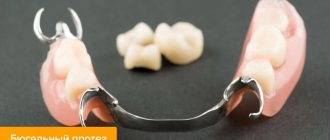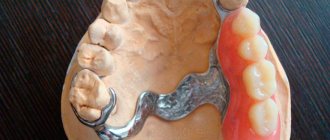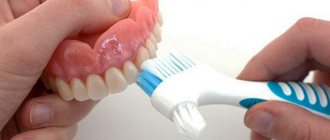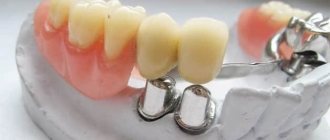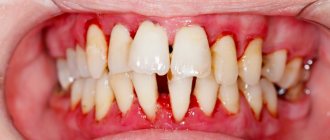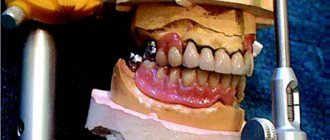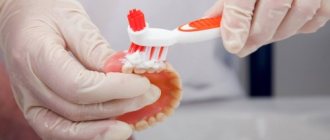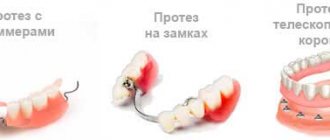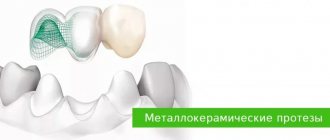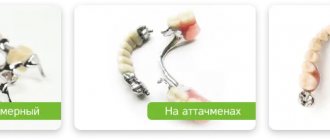Clasp prosthesis with locks
- one of the varieties of partial clasp removable structures, which is fixed on the supporting teeth with the help of locks.
This option is considered one of the most advanced designs. Clasp dentures with locks consist of a metal frame in the form of an arc. The frame is a plastic base with artificial teeth with fastenings-locks. One fastening element of the prosthesis is located on the supporting tooth under a metal-ceramic crown, and the second is located directly on the clasp prosthesis. This type of prosthesis has another name - clasp prosthesis with attachments
(from the English word “attachment”, which is translated as “fixation”, “attachment”).
Consultation with an orthopedic dentist—RUB 1,000.
Double-sided clasp prosthesis with locks - RUB 71,000.
Double-sided clasp prosthesis using Bredent locks - RUB 50,000.
Friction pin - RUB 9,200.
At CELT you can get advice from a dental specialist.
- The cost of an orthopedic consultation is 1,000
Make an appointment
Indications
The main indication for the use of clasp dentures with locks on the upper or lower jaw
is the impossibility of installing implants. It is also important to have supporting teeth on which they can be securely fixed. As for other indications, they are as follows:
- terminal defect of the dentition on one or both sides;
- a large extent of the dentition defect, i.e. the absence of several teeth in a row.
Contraindications
- the frenulum of the tongue is not long enough;
- deep bite;
- pathological conditions of the oral cavity in the acute stage;
- diabetes;
- individual metal intolerance;
- lack of supporting teeth;
- pathologies of oncological nature;
- insufficiently deep floor of the oral cavity.
Features of locking
Clasp dentures with locks can be used on the upper and lower jaws, thanks to their reliable fixation. Clasp dentures with attachments, photos of which you can see on our website, have supporting parts that are located on the inside of the oral cavity. They are ideal for use with the last teeth extracted and with extracted teeth limited to other teeth. The locking mechanism consists of two parts: the first (matrix) is integrated into the crown or other non-removable structure, and the second (matrix) is connected to the base of the prosthesis. It is worth noting that, unlike the clasp variety of yoke dentures, locking analogues eliminate the transfer of intense loads to the supporting tooth. The only drawback is the higher cost of clasp dentures with locks
. Prices are determined by the labor intensity and complexity of their production. However, clasp dentures with locks, the prices of which are slightly higher than clasp dentures, will “work out” every ruble invested in them. They are very convenient and easy to use, do not affect diction, and do not cause discomfort when eating.
Indications for installation of a locking clasp prosthesis
A clasp prosthesis of a locking type is used in the following cases:
- absence of 3 or more teeth in a row on the front or side of the jaw;
- impaired diction and chewing function due to the loss of one or more teeth;
- mobility of the dentition in advanced stages of periodontitis;
- atrophy of the alveolar processes (dental bed), in which it is impossible to place a plate (acrylic, nylon) prosthesis;
- bruxism (night grinding of teeth) or increased wear of enamel;
- atrophy of the jaw bone tissue and other pathologies in which it is impossible to perform dental implantation.
Clasp lock device
Fixation with micro-locks has its own characteristics. Thus, half of the element is located directly on the orthopedic structure, and the second is on the supporting teeth, hidden under metal-ceramic crowns. Reliable fixation of the prosthesis is carried out by clicking the lock and prevents it from moving or falling out. The type of micro-lock plays an important role in this case. According to reviews of clasp dentures with doctors’ locks, the best types of locks are “MK-1” and “Bredent”, made in Germany. "MK-1" is a bolt-type lock, but the clasp prosthesis is based on "Bredent" locks
has a friction type attachment. It is very important that not only the prosthesis itself is of high quality, but also that its lock is reliable and durable.
Attachment option (lock fastening)
One of the parts of the micro-lock (attachment) is located on the teeth enclosed in metal-ceramic crowns, and the second is on the clasp prosthesis. The mechanism snaps into place and provides a secure fit.
According to the method of fastening, locks are divided into the following types:
- intra-root, which are held on root caps;
- placed inside the product;
- soldered to the surface of the implant.
Before installing the prosthesis, the specialist cleans the enamel using ultrasound. It is important to cure all pathological phenomena in the oral cavity. A mandatory step is the installation of at least four crowns on the treated and ground abutment teeth. After completing the procedures, the structure is placed on the surface of the jaw.
Lock fastenings have a number of advantages - they are practically invisible, comfortable, and last 5-7 years or more. The design is considered high-tech and requires highly qualified specialists, but is not visible to others.
There are several types of attachments:
- hinged - joint;
- labile - shifting in any plane;
- crossbar - having a small valve;
- anchor - linked by a sphere or a button;
- semi-labile - capable of moving vertically;
- beams - a thin rod between the crowns that fits into the groove on the bottom of the prosthesis.
The choice of prosthesis is made by an orthopedist, focusing on the needs of the patient. The main mechanical impact in a design with a rigid connection is transmitted to the abutment teeth taken under the crowns. In a softer version, the load is evenly distributed over the entire jaw.
According to the level of rigidity, attachments are divided into three types:
- the toughest ones are red;
- medium hard - yellow;
- soft - green.
The locking mechanism quickly weakens, and the locking elements may need to be replaced every year and a half. The cost of repairs is about 100 rubles. The orthopedist removes worn parts and immediately installs new ones.
Where to make?
If you want to be sure of the quality of the clasp prosthesis (Moscow)
and its installation, as well as the fact that they will select for you exactly the option that will best suit your individual characteristics, contact the orthopedic dentistry of our CELT clinic. The quality of our designs allows:
- distribute the chewing load evenly;
- prevent loosening of teeth;
- guarantee a high level of aesthetics;
- provide physiological load on the tooth;
- prevent damage to enamel and gum tissue when removing/installing a prosthesis.
How is prosthetics performed?
Prosthetics using a clasp design is quite lengthy and complex, but justified by excellent results. The first stage of treatment is a thorough clinical examination. The dentist conducts an examination, assesses the topography and size of the dentition defect, the condition and position of natural teeth. The type of occlusion, interalveolar distance, nature of teeth closure and other factors that may affect the success of treatment are determined. The patient is prescribed additional research methods (radiography, CT).
At the next visit, the specialist makes an accurate diagnosis and selects a suitable clasp prosthesis. The patient is informed about fixation methods and chooses the desired one. The dentist takes individual impressions of the jaws and passes them on to the dental technician.
In the dental laboratory, jaw models are cast, examined, and the future design is modeled. Several oral fittings are required during the manufacturing process. The finished structure is handed over to the dentist. The doctor tries on the prosthesis in the mouth and tells the patient how to put it on and take it off. Gives recommendations for use and hygienic care.
Advantages:
- Excellent aesthetic characteristics (metal elements are hidden under the crowns);
- Maximum reliable fixation of the orthopedic structure;
- The ability to chew food thoroughly without experiencing pain;
- Long period of operation - about seven years;
- Quick adaptation due to the small volume of the prosthesis, eliminating diction disorders;
- High repairability of the structure;
- The rigidity of the metal that underlies the structure determines the uniform distribution of the load throughout the entire dentition, which makes it possible to stop gum atrophy.
Advantages and disadvantages
With high-quality prosthetics, taking into account all the individual characteristics of the patient, the clasp has many advantages:
- Excellent functional properties;
- Full restoration of functions;
- Strong fixation;
- Possibility of treatment in the absence of varying numbers of teeth;
- Possibility of prosthetics for diseases of periodontal tissues, mobility;
- Protection of periodontal tissue from unwanted load;
- Splinting;
- Elimination of horizontal pressure and proper distribution of chewing load;
- Support-retaining fixation elements prevent subsidence of the prosthesis;
- During use, prevention of alveolar ridge atrophy occurs;
- Possibility of prosthetics for location anomalies (tilting, rotation of teeth);
- Excellent fixation and stabilization;
- There is no need to prepare the abutment teeth;
- With the help of a prosthesis (onlays, splinting), you can change the height of the bite;
- Good aesthetics and appearance of the structure;
- The clasp takes up little space in the oral cavity;
- Tactile, taste or temperature sensitivity is not impaired;
- Quick habituation process;
- Simple hygienic care;
- Long service life;
- The prosthesis can be adjusted;
- The strong position of the clasp gives self-confidence to each patient, the use of the design is psychologically comfortable.
The disadvantage of the clasp is the complex manufacturing technology, which requires the skills of a doctor, special equipment, and materials from a dental technician.
What is the price?
The cost of a clasp denture with locks depends on which clinic you go to. If you want to be sure of the quality of the design, you should not save. Approximate prices for Moscow are as follows:
- One-sided clasp design - from 40 thousand rubles;
- Clasp prosthesis with reliable “Bredent” locks - from 40 thousand rubles;
- Clasp prosthesis with reliable locks “MK-1” - from 50 thousand rubles.
You can find out the prices of clasp dentures at the CELT clinic in this section or by calling us and making an appointment for a consultation.
Prices
Average prices in private dentistry:
- design with 2 dental crowns – 35,000 rubles;
- design with 4 crowns – 45,000 rubles;
- one-sided prosthesis – from 30,000 rubles;
- device for the entire jaw - about 50,000 rubles.
Additionally, you will have to pay for taking dental impressions - 1000 rubles. These casts are needed to make a plaster model of the jaw, which will be used to make an individual design. The production time for the device is 12-14 days.
If you are looking for a dentistry with optimal prices for dental prosthetics, we suggest using the information on our website. The largest database of specialized institutions is collected here.
How to care?
Orthopedic structures require proper care. This is the only way they will provide their owners with maximum comfort and serve for a long time. Caring for them includes the following:
- Rinse the denture with clean boiled water after each meal;
- Regular cleaning at home using special solutions and brushes;
- Professional cleaning in dentistry.
Clasp prosthetics at the CELT clinic are performed by specialists with extensive experience. They have modern equipment and high-quality materials in their arsenal, which is the key to the success of the treatment. At the same time, we try to keep prices affordable and cooperate with modern, proven dental laboratories. Contact us!
Make an appointment through the application or by calling +7 +7 We work every day:
- Monday—Friday: 8.00—20.00
- Saturday: 8.00–18.00
- Sunday is a day off
The nearest metro and MCC stations to the clinic:
- Highway of Enthusiasts or Perovo
- Partisan
- Enthusiast Highway
Driving directions
Indications and contraindications for use
Clasp dentures are used for treatment in the following clinical situations:
- Dental defect in the anterior or lateral part of the jaw;
- Loss of several teeth in a row;
- Lack of teeth, which is combined with periodontal diseases, abrasion of dental tissues;
- Mobility;
- Unilateral or bilateral root defects.
Prostheses are not installed in the following cases:
- Absence of all teeth;
- Presence of less than 5 supporting teeth;
- Low height of clinical crowns;
- Poor hygienic care of the oral cavity;
- Severe periodontal tissue diseases;
- Acute inflammatory processes in the oral cavity;
- Dental diseases;
- Deep bite;
- Diseases of the temporomandibular joint;
- Allergy to materials used;
- Serious pathologies of the body;
- Period of exacerbation of diseases.
Why should you entrust us with the manufacture and installation of clasp dentures?
High level of specialists.
Our products serve for at least 10 years, performing all the functions assigned to them, thanks to the correct choice of fastening type and competent calculation, which becomes possible only with many years of daily practice and constant improvement of skills and knowledge.
Teamwork.
Thanks to the coordinated actions of each of our doctors, dental technicians, administrators, and assistants, you receive a denture with locks on time and with a predictable result. We don't serve breakfast and keep our promises.
Impeccable workmanship
- jeweler precision of technical operations - modeling and casting of the frame, the use of digital technologies, as well as strict control at each stage help to achieve 100% aesthetics and full functionality.
Preparation according to all rules
– before installation, we must make sure that all pockets of caries have been eliminated, we carry out professional cleaning, and provide instructions for use and care. This way we preserve the remaining “natural” teeth and extend the service life of artificial ones.
Affordable price.
We have one of the most attractive ratios between price and quality in Moscow. In addition, we regularly hold promotions, offer installment plans, credit and tax deductions, and will find a way to reduce the price without compromising aesthetics, functionality, durability and timing.
Clasp dentures with locks are popular, aesthetically pleasing and affordable. Don't put off regaining your beauty and confidence.
Have you decided? Come for a free consultation. We'll take a look, answer questions, and dispel doubts.
Clasp denture with locks, clasps or crowns
Any dentist will say that the best prosthesis is an implant, but at the same time, such prosthetics are still the most expensive, and therefore not every patient can agree to it. And not only for financial reasons one has to refuse implantation, but also because there may be contraindications to such an operation. A clasp prosthesis may be a worthy alternative in this case, unless it causes allergies. Of course, this design also has its drawbacks, but the main advantage is the relatively low cost, compared to implants, and the less time-consuming process of prosthetics as such. So, let’s find out what is good about a clasp prosthesis.
What is a “nylon clasp quadrotti prosthesis”?
Photo: quadrotti clasp denture
Among the offers in the price lists of dental clinics, the quadrotti clasp removable denture is often found. Despite the fact that it is made of nylon, its cost remains high and is completely incomparable with plate prostheses made of the same material. What is its difference and where does the name of this type of prosthesis come from? It was first developed in Italy by a company called QuattroTi. And although it does not use metal structures, it is still a clasp dental prosthesis, the price of which is determined by several factors:
- hypoallergenic components are added to the composition of nylon;
- the strength of the structure is high, so it is possible to use arcs instead of plates;
- The denture clasps can be colored to match the gum color, transparent or white to match the shade of the neck of the tooth.
From an aesthetic point of view, it outperforms other clasp dentures, while in terms of strength it is inferior to them, and it will also require special care products. If such a prosthesis breaks, it will be impossible to repair it.
Constructions using telescopic crowns
This option of prosthetics is considered quite popular in Western countries, but the above-mentioned clasp dentures are not popular in Moscow and other cities of the Russian Federation. The essence of the technique is as follows: initially, the supporting units are prepared, then metal caps are placed on them. A special cement composition is used to fix the orthopedic product.
As a rule, the above metal caps serve as supports for crowns located on the clasp and connected to the metal base of the structure. This fastening method promotes strong fixation of the prosthesis, allows for optimal distribution of the chewing load, provides the necessary aesthetic effect and has more reasonable prices compared to products with clasps.
Clasp prosthetics: patient reviews
Regarding clasp dental prosthetics, reviews from both patients and dentists are as positive as possible. Due to the fact that prostheses of this type are made on a cast metal frame, it is technically possible to reduce the base of the prosthesis, which makes the prosthesis as comfortable as possible for wearing, chewing and articulating speech.
- Convenience of wearing a prosthesis - prosthetics with clasp dentures of the lower jaw allows you to achieve greater freedom for the tongue, reduce diction disorders, and reduce the risk of the prosthesis falling out due to tongue movements.
All this is achieved by reducing the plastic base of the prosthesis in the sublingual area (Fig. 1). When replacing the upper jaw with dentures made of plastic or nylon, the entire palate on the patient’s upper jaw will be covered by the base of the prosthesis. If prosthetics is carried out using a clasp prosthesis, then the anterior part of the palate, which is responsible for diction and taste sensations, remains open (Fig. 2). - Do not worsen diction - the problem of poor diction after removable dentures usually arises due to the presence of a thick plastic base on the inside in the area of the front teeth on the lower and upper jaws. Thanks to the thin metal arch, clasp dentures do not have a plastic base in these areas, which allows you to maintain good diction.
- Comfortable chewing - the more chewing pressure is transferred from the denture to the gums, and not to the supporting teeth, the greater the discomfort and pain will be during chewing. Clasp dentures with clasps transfer approximately 1/3 of the chewing load to the supporting teeth, which is already a better indicator compared to dentures made of plastic or nylon. Clasp dentures with locking fastenings transfer approximately 1/2 of the chewing pressure to the supporting teeth and, accordingly, they will be the most comfortable for chewing.
- Long service life - the recommended service life for dentures with clasp fixation is 4-5 years, which is quite a long time by the standards of removable prosthetics.
For clasp dentures with locking fastenings, as well as with telescopic crowns, the service life should be at least 7 years (although the prosthesis may require relining of the plastic base). But ordinary removable dentures made of plastic are ideally recommended to be changed every 2-2.5 years. This is due to the fact that the tissues of the prosthetic bed (gums, bone tissue) under such dentures atrophy faster than under clasp dentures. Tissue atrophy leads to the fact that the tissues of the prosthetic bed gradually cease to correspond to the shape of the prosthesis, which over time leads to pain when wearing the prosthesis and deterioration of its fixation on the teeth.
- Good fixation in difficult situations - if locking fastenings are used in this type of prosthesis, this allows us to solve the problem of fixing the prosthesis in the most difficult situation in the oral cavity (in the presence of terminal defects of the dentition). Other types of prostheses in this case will necessarily balance and fall. In principle, in case of terminal defects, this is the only good option for fixing a removable denture, or another option is dental implantation.
- Reliability and strength – the risk of breakage of the clasp prosthesis is extremely low precisely due to the use of a solid metal frame. This cast frame is the basis of the prosthesis, and it is made of a durable cobalt-chromium alloy.
Alternatives to partial dentures –
Most experts clearly consider clasp dentures to be the best option for removable prosthetics in case of partial absence of teeth. However, the following partial dentures can be fabricated as an alternative:
- dentures made of acrylic plastic,
- Acry-Free dentures,
- nylon prostheses,
- conditionally removable dentures supported by several mini-implants (although this type of denture is most often used in the case of complete absence of teeth, in some cases it can still be made in case of partial absence of teeth, when a large group of teeth is missing in a row).
What care do clasp dentures require?
As with the installation of plate dentures, the beginning of wearing the clasp variety may be associated with unpleasant sensations. Some people may experience a gag reflex at first, but after a couple of days they will get used to it. Speech defects are also observed, and the dentist may advise putting a lollipop in the mouth and performing certain exercises so that the oral cavity and tongue get used to the new position. Since the palate is not completely covered during clasp prosthetics, fewer side effects may be observed than when wearing a plastic removable denture.
During the adjustment period, you should not eat sweets such as toffee, as they can dislodge the prosthesis and also chew very hard food. You need to care for your clasp denture during the same period as your natural teeth. Ideally - in the morning and evening. After all, plaque also accumulates on it. It is not recommended to take off such a prosthesis at night, especially at first, so that you can get used to it faster. If you need to remove the prosthesis for some time, then you should not keep it in water or any other liquid.
Quadrotti dentures require special care, as they can fade from regular mouthwashes and toothpastes. The dentist who installs this type of prosthesis will tell you what products to use.
It happens that clasp dentures break. But this is not yet a reason to apply for a new prosthesis of the same or a different type. You can go to the clinic where this prosthesis was made and have it repaired under warranty. Typically, such structures are guaranteed for a period of one year.
Differences between clasp dentures and other types of dentures
As we said above, the main difference between this type of prosthesis and prostheses made of acrylic plastic and nylon is the presence of a metal frame (Fig. 2). Most often, the metal frame is made of cobalt-chromium alloy, titanium, or alloys with the addition of precious metals. A base, which can be made of pink plastic, nylon or Acry-free material, is welded onto the finished metal frame, and then artificial plastic teeth are fixed to the base.
Due to the presence of a metal frame, it is possible to significantly reduce the volume and thickness of the plastic base, and as a result, such a prosthesis takes up significantly less space in the oral cavity. Figures 7-8 show how clasp dentures differ in size from traditional dentures made of acrylic plastic. These differences are especially noticeable in the area of the front teeth and on the palate, where the clasp denture does not have a massive bridge, but only a thin metal arch.
Comparison of acrylic and clasp dentures –
Thus, a classic clasp prosthesis consists of - 1) a metal frame, 2) a base made of acrylic plastic or nylon into which artificial teeth will be installed, 3) a system for fixing the prosthesis to the supporting teeth. We will dwell on the latter in more detail below. But I would like to say a few more words about the options for the base of the prosthesis, which is traditionally made of pink acrylic plastic.
However, if the patient wishes, the base can also be made of either elastic nylon (which is not recommended) or Acry-Free material. Acri-free material is a new generation material, and unlike nylon, it has only a small degree of elasticity. Modern complete and partial removable dentures are made from this material, but the base of a clasp denture can also be made from it (though this will cost a little more).
What are the stages of making a clasp denture?
Clasp dentures differ in the technology of frame manufacturing. They are soldered or cast into an all-metal structure. It is also possible to obtain a frame by high-precision milling and sintering nanoparticles using a laser. The last of these methods is also high-precision, so it is preferable to choose it, along with milling: the prosthesis will fit better.
The process of obtaining such prostheses, as with other technologies, is gradual. The stages of manufacturing a clasp prosthesis are as follows:
- taking an impression of the patient;
- casting a plaster model;
- scanning it into a computer to create a 3D model;
- automatic milling or laser sintering.
So making a clasp prosthesis is a high-tech process and requires expensive, complex equipment. But it is precisely thanks to it that it is possible to significantly reduce the time required to process the finished structure and make the fitting process more comfortable for the patient. The accuracy of repeating the shape of the gum with these two technologies is up to 10 microns.

